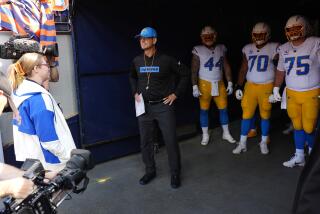MORNING BRIEFING
- Share via
Several years ago, during an off-season when an NFL player seemed to be getting arrested every day, Tony Dungy was asked what he thought contributed to the rise in off-field problems.
“There is no rise,” Dungy replied in his understated way, then interrupted the call for a few seconds to fetch some papers from his desk.
“I’ve got it right here,” he continued. “The rate is the same as it always is. For the last 10 years, it’s about 19 to 23 players in trouble in the off-season. Right now, we have 17.”
That is Tony Dungy. Most coaches think only of the small world within their practice facility and stadium. Dungy thinks of the fate of the entire world.
During a period when most coaches are worried about player meetings and workout regimens, he was assiduously tracking the off-field problems of NFL players, something he has done for years.
So is it any surprise that one of his priorities during his retirement will be seeking ways to mentor troubled teenagers?
Let’s make a couple of things clear.
He is not St. Tony and doesn’t want to be viewed that way, although his religious convictions are deep and often expressed publicly. Nor is he the only elite NFL coach with concerns outside of football.
Bill Cowher stepped down a year ago after 16 seasons in Pittsburgh to spend more time with his family. He chose not to return to coaching this year so he can stay home while his youngest daughter finishes high school.
Mike Holmgren left Seattle after 10 seasons there and seven before that in Green Bay. Most recently he has been helping his wife, Kathy, a nurse, care for Seattle’s homeless. And he had no complaint when his wife and daughter were in Africa on a medical mission when the Seahawks were in the Super Bowl three seasons ago.
But Dungy is different because he has forever broken the stereotype of a coach.
“When I grew up, I viewed an NFL coach as a middle-aged white man, a Vince Lombardi or a Tom Landry with a stern look on his face walking up the sidelines,” he said during Super Bowl week two years ago, when he and his friend and protege, Chicago’s Lovie Smith, were the first two black men to coach in football’s biggest game.
“Now you can’t say that.”
White coaches know that, too.
“I think his impact on the league has been somewhat transforming,” Baltimore’s rookie coach, John Harbaugh, said the day Dungy retired.
Nor is everything about race.
Dungy talked constantly to his players about being targets, once describing to a visitor the specifics of how he counsels them to avoid the wrong people, the wrong places and the perils of driving in the early morning after a few beers.
“In other words,” said the visitor, “young black men out in expensive cars late at night.”
“Young white men, too,” said Dungy, who as an assistant coach in Kansas City once was stopped by police in what was later described as a “DWB” -- driving while black. He won’t discuss it.
In truth, race will always be part of Dungy’s legacy -- at age 33, when he already was a defensive coordinator, he started to be mentioned as a potential head coach. No one that young got head coaching jobs in those days, but the NFL was under pressure to push minority hiring and Dungy was so talented that he stood out even at that young age.
As it turned out, he didn’t get a head coaching job until he was 41, in Tampa Bay. He views that as a positive.
“I wasn’t ready at 33,” he conceded a couple of years later. “I learned a lot about everything in the years I waited, most of all how to deal with people.”
Still, that 1996 hiring made him one of the first head coaches of his race. He turned around a historically bad franchise, then used his success as a platform to speak out on minority hiring. When he left the Colts, he had a 148-79 record as a head coach and a record 10 straight playoff appearances in Tampa and Indy, a sign to everyone that yes, African-Americans are as qualified as anyone else.
Dungy himself is the anti-celebrity, well aware of his influence but quick to put average folks at ease.
Three years ago, two hours or so before the Colts played an important game against San Diego, a hotel elevator carrying some fans and a couple of reporters stopped to let on more passengers. As the doors closed, a voice yelled: “Hold the doors!”
On popped Dungy. No security guards, standard issue with many coaches. Just Tony. Smiling, he greeted the reporters by name, then said “hi” to the fans, several of whom appeared in awe.
By the time the elevator reached the ground floor, they were in awe for a different reason: Dungy had signed half-dozen autographs. In the lobby, wading through a hundred or more fans, he waded through the lobby, pen in hand, signing his name for as many as he could.
The game could wait.
Ordinary folks couldn’t.
More to Read
Go beyond the scoreboard
Get the latest on L.A.'s teams in the daily Sports Report newsletter.
You may occasionally receive promotional content from the Los Angeles Times.










